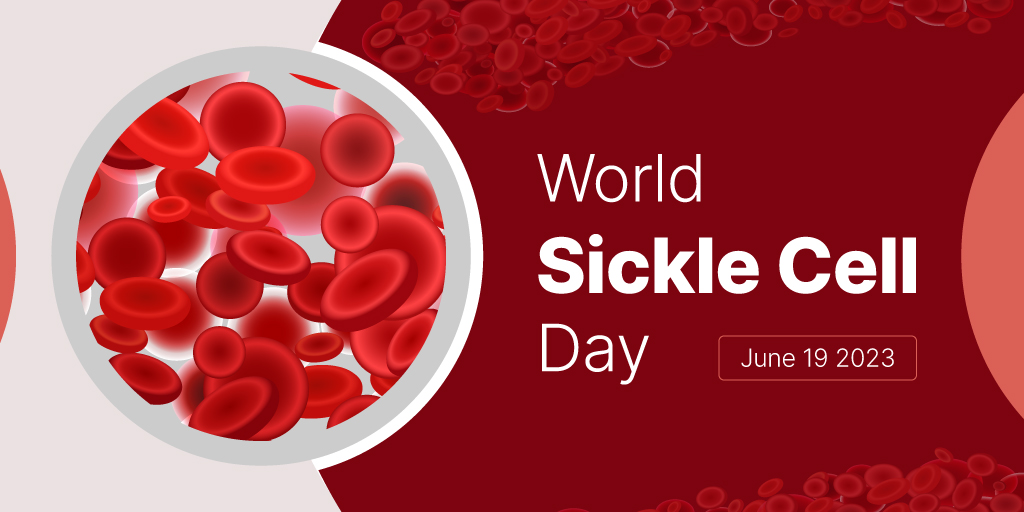Every year, on June 19th, the world observes Sickle Cell Day, a significant event aimed at increasing awareness and understanding of sickle cell disease (SCD). Sickle Cell Day serves as a platform to shed light on the challenges faced by individuals living with this genetic condition and to emphasize the importance of support, education, and medical advancements.
Sickle cell disease (SCD) is a chronic single-gene disorder causing a debilitating systemic syndrome characterized by chronic anaemia, acute painful episodes, organ infarction, and chronic organ damage and by a significant reduction in life expectancy. Under National Health Mission, the Government of India supports the states for the prevention and management of sickle cell disease as per their annual PIP proposals. The Ministry also released technical operational guidelines for the prevention and control of hemoglobinopathies in 2016 including sickle cell anaemia. Further, in terms of treatment, support is given under NHM for capsule hydroxyurea and free blood transfusion for all Sickle cell patients (men & women) as per State’s proposal.
In the union budget of FY 2023-24, it is announced to launch a mission to eliminate sickle cell anaemia by 2047. The mission entails a focus on awareness creation, universal screening of approximately seven crore people in the 0-40 years age group in affected tribal areas and counselling through collaborative efforts of central ministries and state governments.
State Haemoglobinopathy Mission has been established in Madhya Pradesh to tackle the challenges in screening and management of sickle cell disease. A pilot project launched by Honourable Prime Minister on 15th November 2021 for screening in Jhabua and Alirajpur districts of M.P and 89 tribal blocks included in the Second Phase of the Project. As reported by the state, a total of 993114 persons have been screened. Out of whom 18866 have been detected with HbAS (Sickle Trait) and 1506 (HbSS sickle disease). Further, the state government has established Integrated Centre for Hemophilia and Hemoglobinopathies in 22 Tribal District for the treatment and diagnosis of patients.
Understanding Sickle Cell Disease
Sickle Cell Disease is an inherited blood disorder that affects millions of people worldwide. It primarily affects individuals of African, Middle Eastern, Mediterranean, and Indian descent. SCD is characterized by abnormal haemoglobin, a protein responsible for carrying oxygen in red blood cells. Instead of the usual round shape, the red blood cells in individuals with SCD take on a crescent or "sickle" shape, hence the name.
The abnormal sickle-shaped cells can get stuck in small blood vessels, leading to reduced blood flow and oxygen delivery to various organs and tissues. This can result in severe pain, anaemia, organ damage, and increased susceptibility to infections. SCD is a chronic condition that requires lifelong management and care.
The Importance of Sickle Cell Day
Sickle Cell Day plays a crucial role in raising awareness about SCD on both a global and local level. Here's why this observance is essential:
1. Education and Awareness: Sickle Cell Day serves as an opportunity to educate the general public, healthcare professionals, and policymakers about the disease.
2. Patient Empowerment: For individuals living with SCD, this day serves as a source of empowerment. It provides a platform to share personal stories, celebrate achievements, and highlight the resilience of those affected by the disease. By coming together, individuals with SCD can find strength in their shared experiences and inspire others facing similar challenges.
3. Advocacy and Support: Sickle Cell Day amplifies the voices of patients, families, and advocacy organizations, urging policymakers and healthcare systems to prioritize SCD research, access to quality care, and improved treatments. It is a reminder that more needs to be done to support those living with SCD and ensure their well-being.
Efforts to Combat SCD
Sickle Cell Day also sheds light on the progress made in research, medical advancements, and support initiatives. Here are some key areas where efforts are being directed:
4. Treatment Advancements: Significant efforts have been made in managing SCD, including advances in pain management, blood transfusions, and bone marrow transplantation. Gene therapy and gene editing techniques also hold promise for the future, offering potential curative options.
5. Increased Access to Care: Many regions still face challenges in providing comprehensive care and support for individuals with SCD. Efforts are being made to improve access to healthcare services, promote early diagnosis, and ensure affordable treatments.
Patient Support and Advocacy: Numerous organizations and support groups worldwide are dedicated to raising awareness, providing resources, and advocating for better policies and legislation regarding SCD. They offer a vital lifeline for individuals and families affected by the disease.
Genetic Counseling and Education: Genetic counselling plays a crucial role in providing information and guidance to individuals and families at risk of having children with SCD. Education programs in schools and communities also contribute to early awareness and understanding

 In the union budget of FY 2023-24, it is announced to launch a mission to eliminate sickle cell anaemia by 2047. The mission entails a focus on awareness creation, universal screening of approximately seven crore people in the 0-40 years age group in affected tribal areas and counselling through collaborative efforts of central ministries and state governments.
In the union budget of FY 2023-24, it is announced to launch a mission to eliminate sickle cell anaemia by 2047. The mission entails a focus on awareness creation, universal screening of approximately seven crore people in the 0-40 years age group in affected tribal areas and counselling through collaborative efforts of central ministries and state governments.










.jpeg)

.jpeg)
.jpeg)
.jpeg)

.jpeg)
.jpeg)
.jpeg)
_(1).jpeg)

_(1)_(1)_(1).jpeg)
.jpeg)
.jpeg)
.jpeg)






